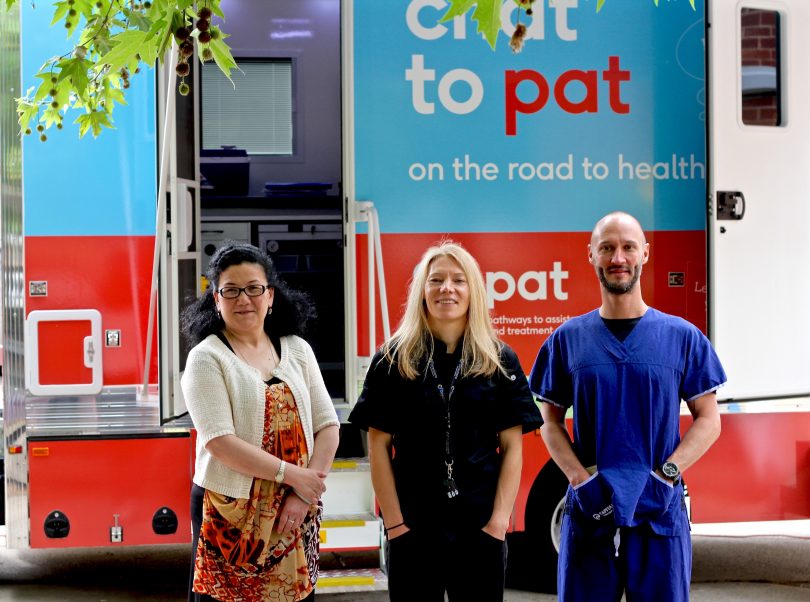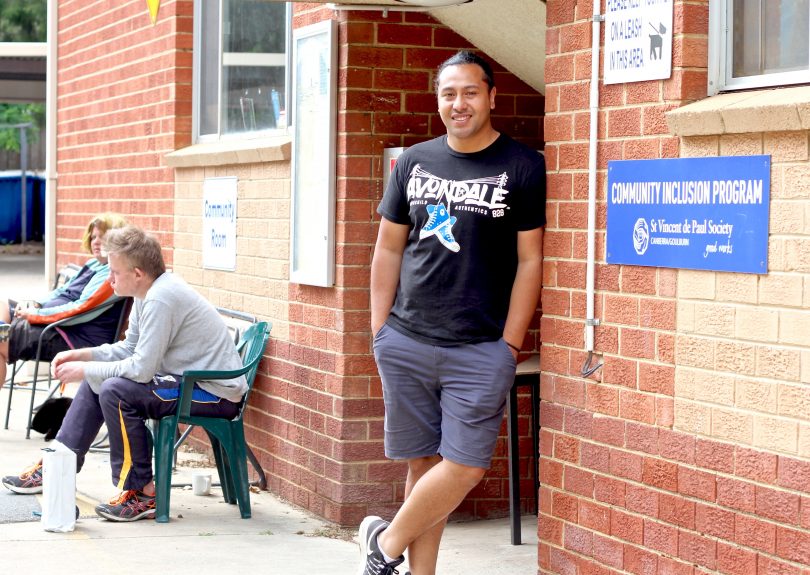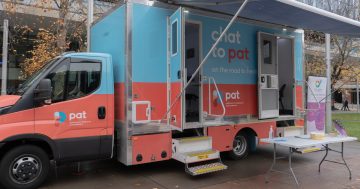
From left: Drug and alcohol social worker Nurgul Sawut, clinical nurse Ali Loom and GP Dr Ben Harkness with the PAT van at Oaks Estate this week. Photo: Michael Weaver.
It’s easy to see why Oaks Estate is still considered the forgotten part of Canberra.
Dr Ben Harkness tells how he decided to put a patient from Oaks Estate in the back of his car earlier this year and rush that person to the emergency department at Queanbeyan Hospital.
“The patient didn’t realise how serious their condition was,” recalls Dr Harkness. “We helped save a life that day.”
The suburb where Canberra was founded may have once had historical significance, but some residents in community housing there don’t even have identification.
The situation is beginning to change, especially for the health outcomes of residents in Oaks Estate, where a new mobile health service van sets up every Wednesday to let them know they are not forgotten.
Known as the pathways to assistance and treatment van, or PAT for short, the van also means Dr Harkness and clinical nurse Ali Loom no longer need to operate out of a suitcase with essential medical supplies, or via a laptop with little or no internet connection.
The van cost about $250,000 to set up and opened on Wednesday, 18 November, where it provided its first service to residents of Oaks Estate public housing. It is also operating at Ainslie Village each Thursday, and the service will soon expand to Reid, Civic and Belconnen.
Operated by Directions Health staff, including a drug and alcohol social worker, a GP and a nurse, the PAT van is supported by funding from the Capital Health Network, the John James Foundation and St Vincent de Paul Society Canberra/Goulburn. A community support grant was also secured with assistance from Member for Bean David Smith.
Nurse Ali Loom, who has worked with ACT and NSW Health, said the outreach van bridges the gap for vulnerable people who needed mainstream health services.
“We see people with a lot of complex health issues such as mental health issues, social issues,” she tells Region Media. “They are disconnected from family and friends and have lower socioeconomic issues. There’s a lot of obstacles and one of them is expecting people here to fit into the mainstream model of health care.”
Dr Harkness says the terms ‘lost’, ‘follow up’ and ‘did not attend’ are common descriptions for patients in Oaks Estate.
“It’s not so much that they’re lost, it’s just difficult for them to come in,” he says.

Community inclusion program coordinator Josh Arona outside the headquarters at Oaks Estate. Photo: Michael Weaver.
A community inclusion program at Oaks Estate has been operating for two years with support from the St Vincent de Paul Society and the National Disability Insurance Agency, an independent statutory agency that implements the National Disability Insurance Scheme (NDIS).
Program coordinator Josh Arona is helping to make sure vulnerable people at Oaks Estate aren’t forgotten and he is slowly changing the outcomes in a place where it often takes 40 minutes for police or an ambulance to arrive and where residents are often isolated due to lack of transport or regular services.
“Oaks Estate is definitely a forgotten part of the community,” he says. “People’s needs here vary, but their health and isolation are two of the key issues they face.”
Directions Health CEO Bronwyn Hendry says allowing Canberrans to have a potentially lifesaving ‘chat with PAT’ is vital.
“Alcohol and drug dependence, and mental and chronic health conditions, are frequently intertwined, and often result in unstable housing and homelessness,” she says.
“Unfortunately, people facing these challenges often find it difficult to access services, particularly holistic services. As a result, they don’t receive the treatment and help they need until they are very sick and require hospital admission.”
The service has been operating right through COVID-19 restrictions, albeit in a safe way, and will continue to make sure vulnerable people are not ‘lost’.
“It’s been a really crazy year for health services, but there’s such a need for vulnerable people in our community to have access to proper health service,” says Ms Loom.
“We’re a fairly well utilised service and it’s such purpose-filled work. It feels like at the end of the day you’ve really helped improve the lives of people. It’s hard work, but really worthwhile.
No appointments are necessary for the PAT van and all services are bulk-billed. Referrals are also provided where necessary.













